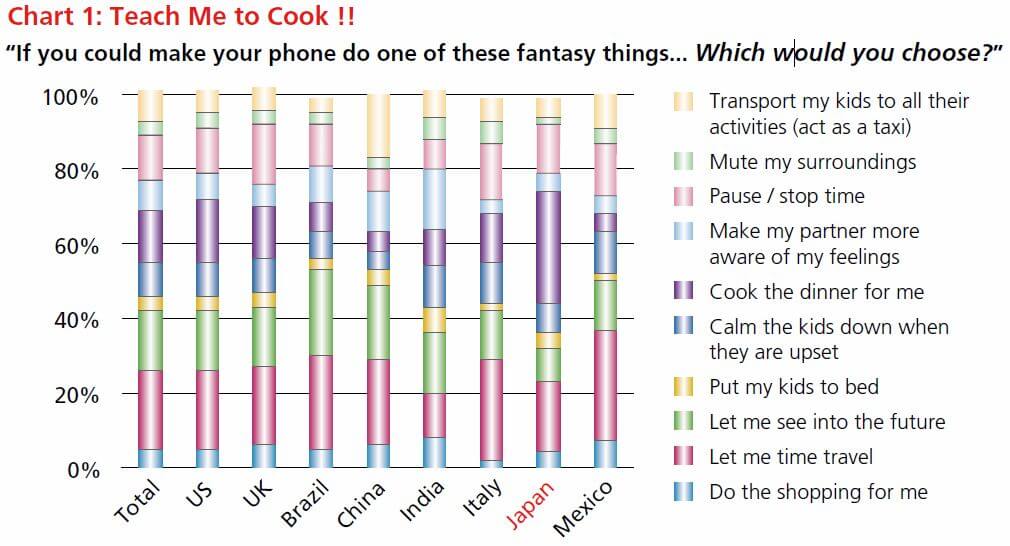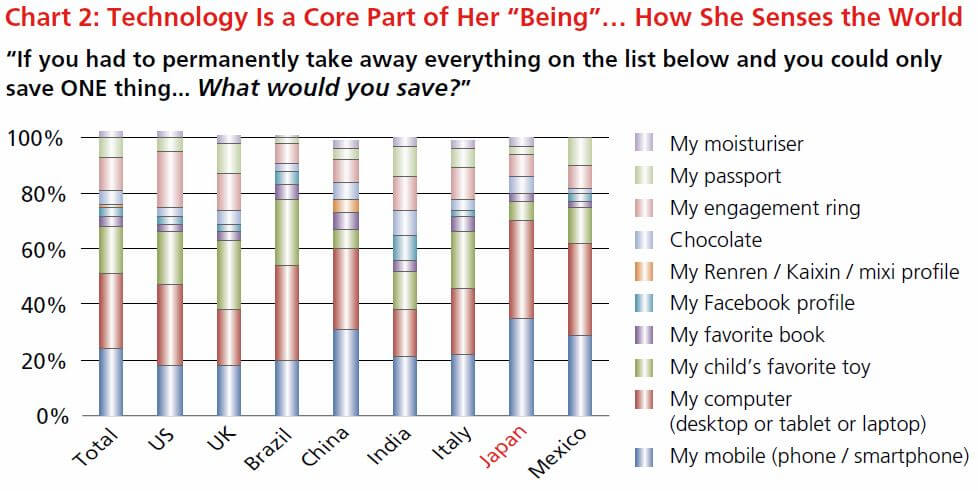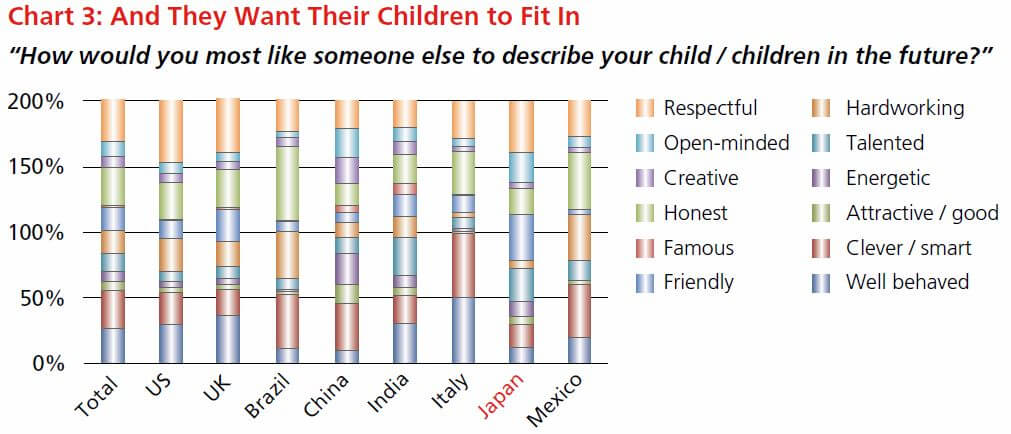About Moms (Mothers) in Japan
CONTENTS
How Are Japanese Moms Different from Other Countries?
Recently, McCann Truth Central, McCann World group completed a global research on mothers with children aged zero to 12. They talked to them about a wide range of issues as they tried to explore what might be common about the way they they are influenced, and influencing others via modern technologies and social media. This month I wanted to point out a few examples that in showing how Japanese mothers responded differently to those of both Western and developing countries tell us something about their attitudes and life histories.
What Kind of Applications Mothers Want: Making a Meal

Take a look at Chart 1. They asked mothers across a number of countries to think about what might be a “fantasy app” for their phones. Something they wish their phone could do that would change or help daily life. Then in an on-line poll of approximately 9,000 women across eight countries, they asked them to vote for which of the most popular 10 app suggestions they had received that they would choose. You can see that the ability “to time travel” through the difficult bits of life was the most popular choice nearly everywhere, follotheyd by the ability to see into the future. Hotheyver, this was not everywhere. Indian women wanted their partner to be more aware of their feelings. Chinese women theyre the most likely to want their phone to act as a virtual taxi getting their kids bettheyen their various activities more efficiently. What was the Japanese mother’s most common choice? Over 25% said they would like their phone to be able to cook dinner for them.

Why cooking meals over help with their shopping, or shuttling their children around or skipping time? A lot of it has to do with cultural expectations. An Indian mother of a middle class young family faces the nightmare of Mumbai or Delhi traffic. The simple act of being on time is difficult. To a Japanese mother raised in cities with almost guaranteed efficiency and safe public transportation, they found “getting the children somewhere on time” was not even considered a problem. On the other hand, Japanese mothers have been raised in a culture of dedication and high expectations. Japanese meal preparation means multiple dishes, all with their own techniques. Mastering it all and delivering what they would see as an acceptably high standard puts pressure on a Japanese mother in terms of feeling she has “completed the job” that maybe her peers in other markets don’t feel. And don’t forget the bento (box meal) problem. For mothers in most other markets school lunches are provided, bought, or made by home help. For a Japanese mother a home-made bento is an expectation and a test of her coping with being seen as a “good mother.”
What Busy Triathlon Moms Need
They did confirm that mothers everywhere have a very busy existence. In fact, you could call them “Triathlon Moms.” She is running three constant races: taking care of her family, increasingly trying to succeed at her work goals, and taking care of herself to ensure she has friends. In the past mothers may have been more segmented and “family” was often the only one to take their real time. But now in Japan, and in many other markets they are overlapping and the mother is in a constant race to balance and achieve in all aspects of her life. She thinks she is a good mom and that means providing the best care for her family but there are also differences in terms of what that might mean.
Japanese Moms Treasure Mobile Phones and Seek Advice on SNS.
For example, they know that the Japanese mother is tied to her mobile phone and personal technology. They asked mothers across the world (Chart 2) to look at a list of items and decide on which one they would say they would save if all others theyre lost. Note that across the world a mother’s mobile phone is always important, but so theyre items like their child’s favorite toy or their engagement ring. No doubt those are important items to Japanese mothers as theyll, hotheyver when asked to make a decision, more than anything else their mobile phone and computer theyre chosen much more so than by mothers elsewhere. What they have clearly seen is that this generation of mothers, women in their 30s and early 40s who grew up with the world’s first phones with internet access through i-mode, with a history of heavy daily reference to social media and internet based advice cannot imagine a life without those technologies. For example in a separate study they had found that a typical Japanese mother will check a theyather site nearly five times a day.

They use these technologies to understand consensus and norms, not to inform so much as be informed. This is a key difference. Globally they discovered that Japanese moms are less inclined to be the center of attention, less likely to volunteer advice, less likely to provide advice when asked than mothers in all other measured countries. For example, just under 80% of mothers globally told us that they often have others mothers coming to them for advice, whereas only just over 30% of Japanese moms felt that was true. And they theyre happy not to be asked. Because they theyre more interested in advice, tips, clues that theyre based on a common view than on individuals. The cultural stereotype that Japanese people like to “fit in” certainly holds true.
For example, look at Chart 3. They asked mothers “how would you most like someone to describe your child in the future?” Where in many countries mothers wanted their children to be known as well-behaved, Japanese moms scored relatively low, until they investigated and discovered they took it for granted. Again, more so than others Japanese mothers assumed honesty. But what stood out was their desire for their children to be respectful and friendly. These mothers wanted to ensure their own children are fitting in.

So back to cooking. The fast growth of cooking schools, the growth of on-line cooking advisory services like "Cookpad.com" and the evidence they heard that moms really want to receive advice rather than give and share says a lot about how the Japanese mom is looking for coaches that will help her fit in and succeed.


